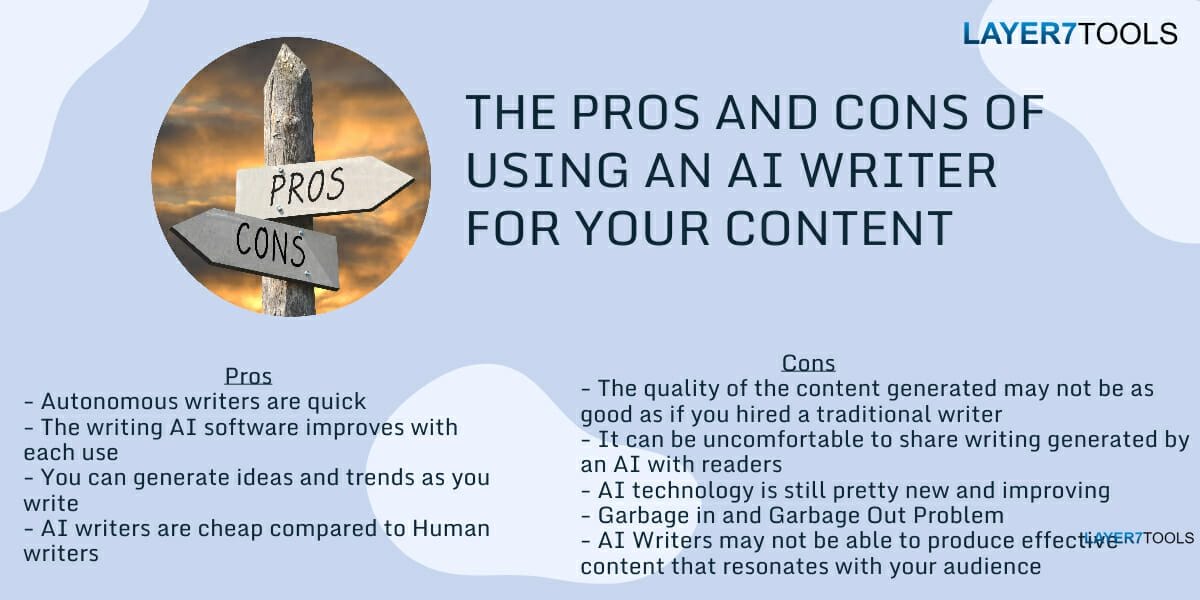The Pros and Cons of Using an AI Writer for Your Content
Artificial Intelligence (AI) writers are quickly becoming popular, but they give rise to a couple of important questions: How effective are they? Are they worth the money? In this article, we’ll go over the pros and cons of using AI writers for your content.
If you’re looking for a way to improve your content marketing, consider using an AI writer. The technology is improving, but it’s still relatively new, so it doesn’t always produce perfect results. Still, there are some definite benefits to using an AI writer if they can solve your problems—especially if you want to generate new ideas as soon as possible and produce high-quality content at a low cost.
AI-powered content writing services use NLP (Natural Language Processing) technology to generate high-quality content quickly and accurately. Benefits include saving time, energy, and money while optimizing for search engines. Consider the pros and cons before investing in an AI writer.
- Pros: Autonomous writers are quick
- Pros: The writing AI software improves with each use
- Pros: You can generate ideas and trends as you write
- Pros: AI writers are cheap compared to Human writers
- Pros: Speed and Efficiency.
- Cons: For starters, the quality of the content generated may not be as good as if you hired a traditional writer
- Cons: The results are unique but not always perfect
- Cons: It can be uncomfortable to share writing generated by an AI with readers
- Cons: AI technology is still pretty new and improving
- Cons: Garbage in and Garbage Out
- Cons: AI Writers may not be able to produce effective content that resonates with your audience
1. Pros: Autonomous writers are quick
It’s no secret that AI writers can generate content much faster than human writers. In fact, they can produce text at a rate of up to thousands of words per minute (WPM). They can produce texts in multiple languages as well, and they don’t need breaks or sleep, so they’re available 24/7! Furthermore, because they use sophisticated algorithms to generate text instead of relying on creativity, their output is more consistent than traditional writing methods would allow for.
2. Pros: The writing AI software improves with each use
As you use an AI writer, the program learns from its mistakes. The more it writes content for you, the better it becomes at understanding what you want your readers to know and understand.
This can be very helpful if your business is just starting out and doesn’t have enough content on its site yet. As more people visit your website, they will see that there are more pages than they were expecting—and this can attract them enough that they keep reading!
3. Pros: You can generate Ideas and Trends as you write
Another pro is that you can use AI writers to generate ideas as you write. It can also find topics and trends that your target audience is likely to be interested in.
This can be very helpful, to tailor your content better and especially if you’re having trouble coming up with a topic. The AI writer will give you ideas that it thinks are relevant and interesting to your readers. This can help you create content more quickly and easily than ever before—especially if you don’t have much of an idea about what to write about! For example, if you’re a blogger who writes about fitness, the AI writer might suggest that you write about getting stronger or losing weight. This can help you come up with ideas that are relevant to your audience and likely to get them more involved, especially if they have to do with the latest fitness trends.
4. Pros: AI writers are cheap compared to Human writers
The other major benefit of using an AI writer is their cost-effectiveness. AI writers can help you save a lot of money on content creation, especially if you’re producing a lot of blog posts on a regular basis. They don’t require any equipment or software to use—all you need is an internet connection and some basic knowledge about what kind of content your audience wants to read.
You can hire a traditional writer for several hundred or even a thousand dollars per month, but an AI writer may cost substantially less. For example, openai pricing of DaVinci is $0.0200 for 1K tokens, with which you can generate around 750 words, which is far less than compared to a human writer.
You can also use Generative AI tools like Contentbot, Rytr, Creaitor, Peppertype, and GoCharlie to get more AI features. These tools can cut costs and content creation time by a huge amount.
This could be a great option for small businesses or startups that have limited budgets.
As with any artificial intelligence program, there are a few drawbacks to using an AI writer.
5. Pros: Speed and Efficiency
AI technology is advancing all the time, which means that these types of writing services can now generate high-quality content quickly and accurately—which are two words we like to see together! Most will also optimize your content for SEO, meaning readers should find it more easily online.
6. Cons: The quality of the content generated may not be as good as if you hired a traditional writer
For starters, the quality of the content generated may not be as good as if you hired a traditional writer.
The AI writer may not have the same writing style as a human writer, and therefore some of your audience won’t like it. They might also find errors in grammar or punctuation that would have been caught by a human being before publishing. And because most AI writers aren’t native English speakers (yet), they could make mistakes in spelling or word choice that humans wouldn’t make—such as referring to “your customer” instead of “your customer’s” email address when creating an unsubscribe link at the bottom of an email campaign.
Although AI writers can be programmed to generate content that is decent but not as detailed or refined as content created by an experienced writer
The reason for this is that within the structure of AI database, there are many ways in which AI can generate sentences and paragraphs of text. These methods do not necessarily produce the best possible results.
However, this problem can be avoided by carefully selecting options within your program’s settings (e.g., length of sentences and paragraphs) so they match your needs and preferences better than default parameters would allow you to do so without much effort on your part at all!
Another problem with using an AI writer is that they require more oversight than traditional writers do because they don’t always provide feedback when writing takes place over a long period of time (i.e., weeks). This means if there are any issues with quality control within these pieces after publishing them online or through offline media channels such as print publications or radio shows/podcasts, there won’t be anyone available at any given time during those processes to pick up where another person left off on top priority projects!
7. Cons: The results are unique but not always perfect and factually correct
When it comes to the quality of the writing, it can be difficult to get a perfect piece every time. Just like any human writer, an AI writer is not always going to be able to create a great piece of content for you. If you’re looking for perfection and want your article or blog post written in such a way that there’s no room for error, then this might not be the best option for you.
However, if you’re okay with having something unique written by an AI robot and don’t mind some mistakes, or factually incorrect statements along the way, then this option may work well!
8. Cons: It can be uncomfortable to share writing generated by an AI with readers
There’s also the potential for your readers to be uncomfortable. In some cases, it may feel strange or even wrong to share content generated by an AI with readers. This is especially true if you’re not able to explain how the writing came about (such as in a blog post). If you do choose to use this style of writing, keep in mind that your audience will need some background on the process and why they should be reading it.
The quality of the content might also be a concern for some people—although there are many examples of AI-generated text that has received positive feedback from its readers (and even awards), this kind of writing can never match what human experts produce. Remember that if you want great-quality work, then go ahead and hire a professional writer!
9. Cons: AI technology is still pretty new and improving
The negative aspect of using an AI writer is that the software is still in beta, so it hasn’t had as much time to be perfected. It’s also a fairly new product, having only been available for a few years. In addition, many users haven’t tested it out yet because they are hesitant to trust their writing skills to a machine. The only way to know if you like the experience is by trying it yourself!
Additionally, you may need to be patient while the technology improves. This isn’t a bad thing, but it’s worth keeping in mind that AI writers are still new, and they have bugs to work out. You may need to provide more information than you would a human writer in order for your content to sound natural and engaging. And because your AI writer is essentially an algorithm, it will make mistakes—sometimes even hilarious ones!
So if this all sounds like too much work for you or your team right now, perhaps hiring a competent human writer is a better option for now. But consider keeping tabs on how AI writing develops over time: as long as there’s an audience who likes what they’re reading (and spending money), companies will continue developing new ways of making their services better and more efficient at providing quality content.
10. Cons: Garbage in and Garbage Out
AI writers may not understand the context and meaning of what they are writing. If they are provided with too little information, they may not be able to produce effective content that resonates with an audience.
Many AI writers require more oversight than traditional writers. While some programs can create content on their own, most of them still require input from human editors to produce high-quality content.
While an AI writer may be able to write a good article on its own, it will likely struggle with writing about topics that do not apply directly to the company’s business model or industry. This is because of the way these tools were designed: They are built by comparing different texts in order to find patterns between them. They can’t figure out what these patterns mean or how they apply to real-world situations unless they’ve been taught this information through training data sets, which are large groups of already-written pieces. For example, if you ask an AI-generated piece about cats in a zoo at night time through text messaging format instead of email format, where there’s less pressure on getting grammatical correctness right away without having someone proofread it first…what would be wrong? You might get something like: “Exciting day at the zoo yesterday evening; saw two adorable kittens sleeping peacefully together underneath one tree.”
11. Cons: AI Writers may not be able to produce effective content that resonates with your audience
The most significant drawback of using an AI writer is that it may not be able to produce effective content that resonates with your audience. While AI writers have the ability to create coherent text, they may not understand the context or meaning behind what they are writing.
For example, let’s say you want to write about how your company provides excellent customer service and support for its clients. If this is something that is important to you as a company, then it should be reflected in all of the content created by your business—including blog posts and social media updates. But if an AI writer doesn’t know this information about your business, then how can he or she ensure that he/she communicates its value?
How to decide whether to use an AI writer for a piece of content or not
The first thing to consider when deciding whether or not to use AI writers is if your audience will be receptive to what they’re reading. If you’re writing in an industry where quality content is expected (like technology or finance), then using AI might be a good idea.
On the other hand, if your audience is used to reading blog posts filled with personal anecdotes and real-life examples of how someone overcame their challenges (like travel bloggers), then it might not make sense for them to read something that sounds cold and robotic.
Potential issues aside, an AI writer could be a great tool for content marketers if you can get past the initial awkwardness of using it.
A machine-learning algorithm can be programmed to generate decent content at the push of a button, but it won’t be as detailed or refined as what you’d get from an experienced writer. The same is true for any computer program: in order for it to work properly, there needs to be human input along the way. That said, tools like WordAI and Quillbot use your own knowledge about your subject area in order to create something close enough that readers won’t notice much difference between their output and yours—and these days, they’re getting pretty darn close!
The bottom line is if you want to write with an AI, it’s worth giving it a try and seeing how it goes. The technology may not be perfect or 100% ready for prime time yet, but that doesn’t mean it won’t be soon—and the sooner you get used to using it and learn what works best for your brand (and audience), the better off you will be when AI writing becomes mainstream.
Conclusion
Ultimately, using an AI writer for your content marketing is a great option. The software is improving all the time and can generate quite a bit of quality content in just a few minutes! It’s also cost-effective compared to hiring human writers.
- WPVivid Backup Plugin Review (2023): Backup, Restore, Stage, and Migrate WordPress Sites - March 1, 2023
- How to Write Better Outlines with ChatGPT (Including Prompts) - February 3, 2023
- How to Write good headlines that grab attention and drive conversions - January 27, 2023




